The Nominated Film You May Have Missed: THE POST
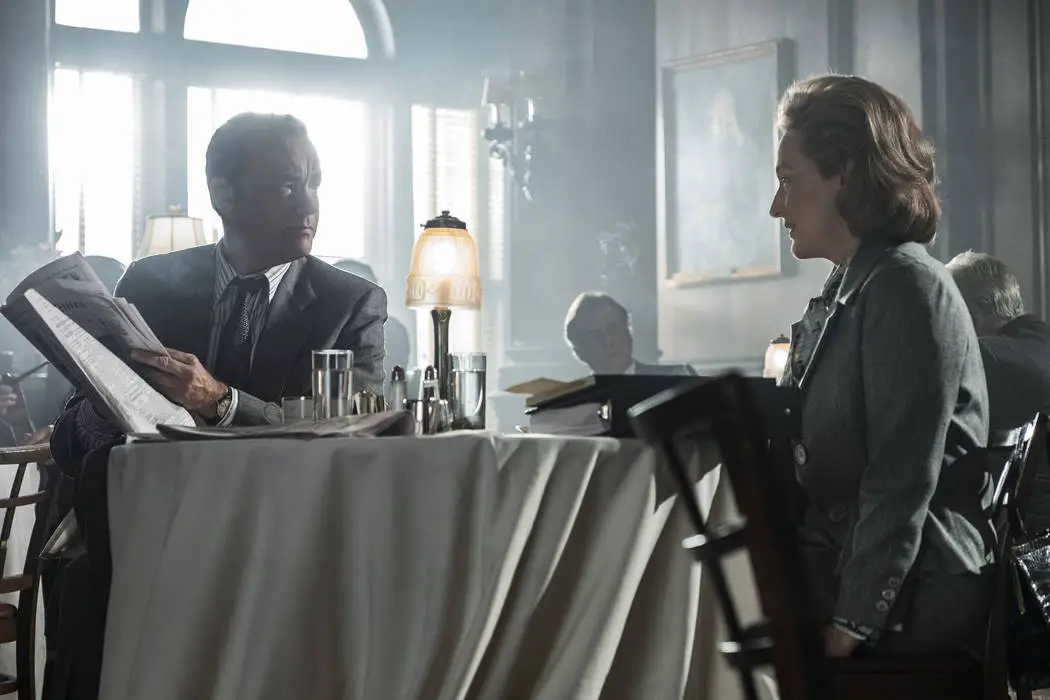
Stephanie Archer is 39 year old film fanatic living in…
Every year, ten movies are bestowed the honor of becoming nominated by the Academy of Motion Arts and Sciences. Many of those films will have already had various success throughout the year – good festival attendance, box office success and the receiving of other prestigious awards. Yet, only one of them ends their evening being declared the best of the best.
Each month, I select one of these films, while honored with a nomination, did not achieve the highest recognition. Bringing them back into the light and into the minds of viewers gives them the chance to shine once again and reach a new group of people who my have never considered the film previously. This month, with the Academy Awards right around the corner, I have chosen to redirect my film selection to recognize one nominated this year for Best Picture that I feel has been the most underrated film of the year – The Post.
While this film has as good a chance as any at solidifying itself as a Best Picture winner, the competition is fierce – a vast array of films with a strong critic and fan backing. For a Steven Spielberg film, I was surprised how many people had not seen the film – or even knew what it was about. With big names attached to star (Meryl Streep and Tom Hanks), The Post seemed like a no brainer for this year’s award season and a sure thing amongst viewers. Yet, while praise for the film continues, awarded by the National Board of Review as the best film of 2017, audiences seemed to remain limited – sadly at a time when the film’s content seems so relevant.
The Post
America, with all its greatest achievements and strives for freedom and equality, is not without its dark moments that glare shamefully from the pages of history. The Vietnam War sadly is one of them. Yet, while the horror of our government sending our men to war knowing it would likely cost them their lives, in a war we had no chance of winning, this became the moment for the press, the people and democracy. When the government was deceiving the public, The Washington Post was there to expose them for their deceit, utilizing their protected right and solidifying themselves as a service to the people. This is The Post.
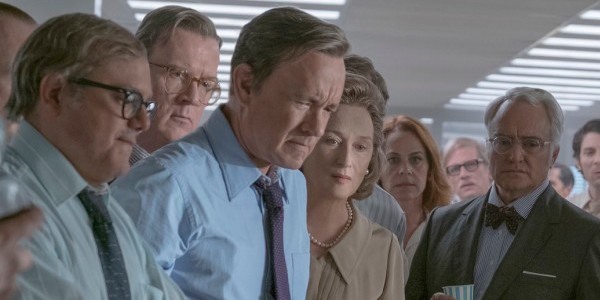
Returning from a visit with the troops heading into battle, Dan Ellsberg (Matthew Rhys), a military analyst, meets with Secretary of Defense Robert McNamara (Bruce Greenwood), discussing and seemingly agreeing with one another that the war is lost and men are dying unnecessarily. But when he sees McNamara, moments after the plane has landed, blatantly lying to the press about what is really happening overseas, Dan begins a treacherous mission to steal all pages of the Top Secret Pentagon report compiled as far back as Truman – sacrificing himself for the greater good.
Having recently inherited The Washington Post following her husband’s untimely death, Kay Graham (Meryl Streep) is focused solely on successfully going public with the small publication, ensuring the company’s future. Faced with oppressing restrictions from the Nixon administration, one of her reporters banned for crashing a party, and an increased difficulty competing with the New York Times, her focus on bringing further backing into the company seems the best way to survive in a fast-paced competitive industry. But when The New York Times releases a new expose, a bombshell article accusing the government of lying to the nation, it seems once again The Washington Post has missed the mark. Then, the New York Times is given an injunction from the government preventing them from printing the papers they obtained from Ellsberg or writing anything about them, so now it is no longer about a small newspaper vs. an industry giant, but the freedom of the press and the rights of a nation.
Striving to find their own way to obtain the Pentagon Pages, Kay Graham and her Editor-in-Chief Ben Bradlee (Tom Hanks) face a decision that could cost them their freedom and the democracy America was founded on.
Posting the Specs
The Post is not a film full of action and scenes of ravaged soldiers on the battlefield. It is a film whose success relies heavily on the strength of its cast, the strength of its story and the ability to work off the emotions of an audience. The film moves in a fairly slow and even pace in the beginning, giving audiences time to get to know the players and understand what is going on. As the journalist team of The Washington Post obtains copies of the entire survey, the intensity heats up in a crescendo of patriotism and democracy. Viewers will find themselves caught up in the story in an instant, unable to specify the exact moment the film “got them”.
Editing in this film was remarkable, especially within the printing press. The sequence intertwined the words of the articles to be printed with the typing machines and printing letters. It is not just the cinematic beauty it creates, but also the metaphorical representation that is brings to the forefront – the ever moving machine. The representation of the machine is open for interpretation – it could be the press, democracy, citizens of America itself. It is a beautiful sequence that thankfully is utilized twice within the film.
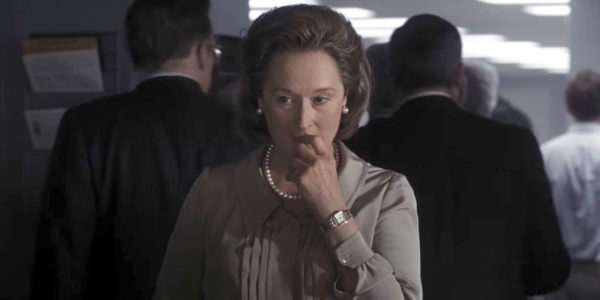
Acting was what you would expect from Tom Hanks and Meryl Streep. These veteran thespians bringing credibility and truth to their characters. Tom Hanks is solid and resolved as editor Ben Bradlee, while Streep confidently portrays a woman’s struggle with confidence and strength in a world of men and business. Kay Graham, having recently inherited The Washington Post following her husband’s tragic “accident” (sadly, his tragic suicide covered up) struggles to find the strength to stand on her own and keep the company alive. She is told what she should do, many times overhearing conversations about her as if she were not in the room, but she finds her voice and her backbone, defying her board, her lawyers and her bankers. Streep encompasses this struggle and growth to perfection, leaving no doubt for her Oscar nomination (her 21st nomination!).
From this solid lead acting foundation, The Post shines through its supporting cast as well. Bob Odenkirk (best known for Better Call Saul and Breaking Bad) is perfect as Ben Bagdikian, bringing determination and resolve to this on edge, wound-up character. Bagdikian’s resilience and detective work lead him to The New York Times’ source, giving his newspaper the edge and lead in the story – the opportunity start a change within the country. When it is revealed what the source truly has to offer, Odenkirk delivers an uninterrupted and true believability to his character, a reaction not of overhyped joyfulness but instead maintaining the wound-up nervousness on a new level. He never betrays his character’s credibility.
Bruce Greenwood, who never fails to deliver a solid performance, and Sarah Paulson, best known for her roles in American Horror Story and American Crime Story, were also a wonderful addition to the cast, even with the latter having a very small role in the film. The biggest surprise was Jesse Plemons, who plays the lawyer for The Washington Post. More and more he has begun to appear in a vast array of films and television shows. While many will remember him from Breaking Bad and Fargo, in the last few months he has starred in not only this film, but in a highly critically praised episode of Black Mirror and Game Night as well. Here, he once again adds a unique performance very different from his previous roles.
Past and Present: Nixon vs. Trump
While Ready Player One was originally believed to be Spielberg’s next release, The Post came bursting onto the scene in late 2017 – a film that had an unprecedented making. Filmed between May and July of 2017, and edited to completion shortly after that, The Post premiered as a limited release December 22, 2017 – proving that All the Money in the World was not the only unprecedented, time restrained showcase of editing and filmmaking last year. But why the rush and insistence of premiering now? Two words: Donald Trump.
As shown in the film, and documented in real life, Nixon banned members of the press from the White House. When one of the reporters of The Washington Post crashed a party, she was banned from covering the wedding for President Nixon’s daughter. Following the Supreme Court ruling that The New York Times and The Washington Post were in their right to publish copies of the Pentagon Papers, official White House tapes recorded President Nixon telling his staff that all members of The Washington Post were no longer allowed inside of the White House – no coverage, no pictures. Any of this sound familiar?
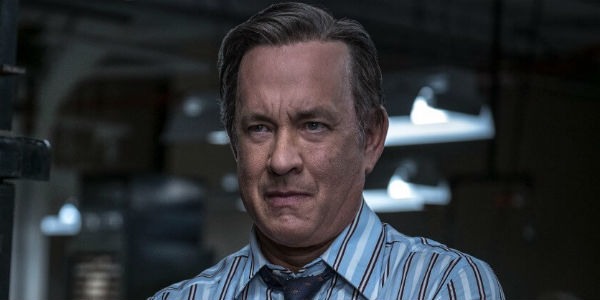
Since his inauguration, and even in the months leading up to it, President Trump called out multiple news outlets (specifically at times CNN) for the “fake news” that they were reporting – many of the reports unfavorable of Donald Trump. As time would pass, and volatile press conferences with the President would be held, the line of questioning and reporting continued to be severely disliked and denied by the President – resulting in CNN, as well as other news outlets, being banned from the White House and presidential event coverage. Many would cry out for the stifling of the press’s freedom, the president only citing it was a result of irresponsible journalism.
Before Nixon and the Pentagon pages scandal, as well as the Watergate scandal, politicians and reporters would hang out, be friends, blurring the line between politics and responsible journalism. This was irresponsible journalism, reporter, editors and publishers intermingled with politicians who had the power and influence to affect what was reported to the public. The move by The Washington Post to publish the Pentagon Papers severed this friendship and proved to the American people that there was someone else looking after them. The press, whose freedom was acknowledged by our forefathers, was permanently printed and ingrained as a new form in our checks and balances system of democracy.
While I cannot say I like or dislike our current president, personally taking each situation as it comes, the denial of coverage by the press was a violation of the freedoms this country was founded on, not just for the press but for me as a citizen of this country. Spielberg’s decision to push this film forward was a timely and appropriate use of the media of film, an art that has the ability to capture and document the feelings of time, history and a country.
Brilliantly, the film ends with the beginning of the Watergate scandal – a reminder of the constant work of the press and the sources who bring the country’s wrongdoings to light.
Whistleblowers
“Wouldn’t you go to prison to stop this war?” Dan responds when asked if he understands the consequences of his actions. He has “betrayed” his country and his government by stealing and providing copies of Top Secret documents to the press for publication. He has leaked “sensitive” information about the wrongdoings in the government and their deception with regards to the Vietnam War. Dan Ellsberg is facing a jail sentence if caught.
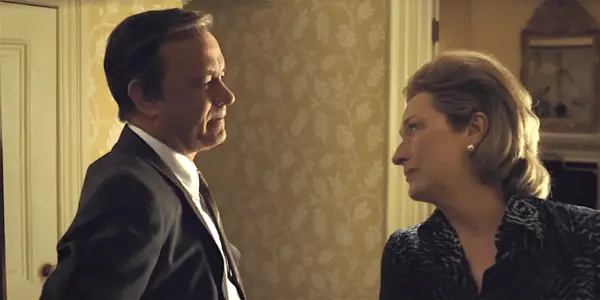
Whistleblowers, in my opinion, have been a vital aspect to maintaining our independence from tyranny and corruption. Many will disagree, but I strongly feel those who have sacrificed their freedom and stability to bring an injustice behind the scenes to light are some of the most patriotic individuals. While they have sworn to never expose or reveal the Top Secret information they are privied to, they find that the information tucked away in the CIA, Pentagon and White House, among other places, is detrimental to citizens and to democracy. Ellsberg saw that the government knew they were sending their boys to die. There was not hope of success, but instead a denial of failure. Without the brave and selfless actions by Ellsberg, who knows how long it would have taken for the government to come forth with the truth and end the senseless war we were in? If Ellsberg hadn’t been the whistleblower our country needed, would the cracks in the tyrannical presidency of Nixon ever begin to form? Would Watergate have ever occurred, unearthing a further corruption in our president and within our government?
When the actions of Snowden were revealed in the late 2000s, I had no feelings towards the man who unearthed violations of my freedom and those around me; instead I truly began to learn the power of questioning my government. When the film Snowden came out in 2016, and the story was revealed – even with the understanding this is a story told through Hollywood – I walked out of the theater feeling unpatriotic. This man, who can never return to our country, showed the world what our government was violating. He forced us to question what we were WILLING to give up as a freedom and what we potentially had no choice. He also forced us to examine the violations of how we treated other countries, and question whether that was something we agreed on. We decided whether we wanted it to continue. If he had not done this, like Ellsberg before him, how many citizens would be viewed through their camera screens, phone calls recorded and listened to and countries monitored? The unpatriotism I felt was due to my lack of acknowledgement and praise for his.
Many will see Ellsberg and Snowden, and the many whistleblowers before and after, as traitors, threatening the safety and security of our country. I believe they are patriots, fighting for true democracy and keeping the public informed enough to make the votes that will shape our country.
Conclusion
The Post is a film everyone should see. It is captivating when you least expect it and a filmmaker’s cry that history seems to be repeating itself. With a strong leading and supporting cast and historical story that needs to be heard, The Post deserves every bit of its Best Picture nomination – a must see film worthy of your reconsideration.
Have you seen The Post? Tell us your thoughts in the comments below!
Does content like this matter to you?
Become a Member and support film journalism. Unlock access to all of Film Inquiry`s great articles. Join a community of like-minded readers who are passionate about cinema - get access to our private members Network, give back to independent filmmakers, and more.












